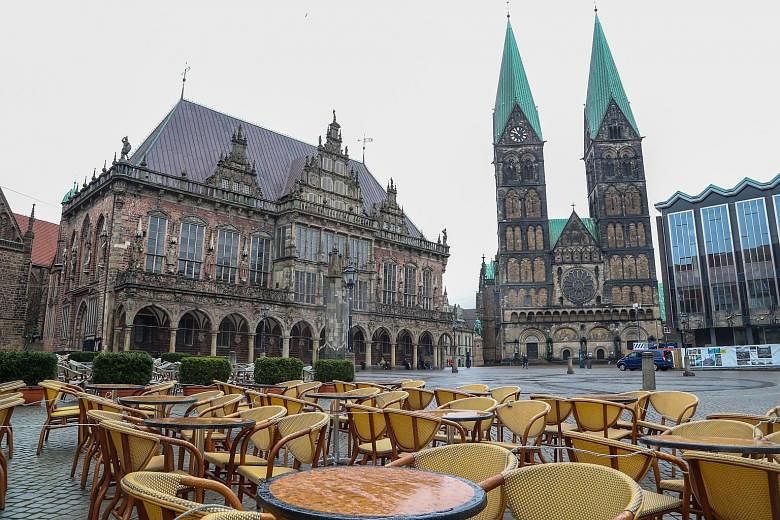By the time the coronavirus crisis is over, we might emerge from our homes only to find some of our favourite shops, gyms and restaurants permanently shuttered.
It does not need to be that way. While some of the harm has already been done, we can still prevent much of the long-lasting damage.
Consider a hypothetical neighbourhood restaurant that, until this crisis, was flourishing.
Business was brisk, the employees worked well together, and customers enjoyed the feeling of being regulars at a place where everyone knew their name.
Then the coronavirus crisis hit. Suddenly, business dried up. At first, there was some takeaway revenue, but even that disappeared.
The bills keep coming. The restaurant owner no longer needs to buy meats, vegetables or liquor, but she is still on the hook for her biggest cost - rent. And she faces an ethical dilemma: Does she use her scant savings to continue to pay her workers?
The example may be hypothetical, but for hundreds of thousands of restaurants around the country, the story is all too real.
As Mr Ben Leventhal, chief executive of online restaurant reservation platform Resy, said, "we're in uncharted territory", and restaurants are struggling to survive.
But there are tools that can be used to create better outcomes.
REDUCE BUSINESS COST
The government can unilaterally freeze commercial rent and mortgage payments for small businesses. The policy can be targeted at businesses that use less than a certain square footage.
This would shift the loss to the owners of those properties and mortgages, but many of them are large diversified companies with a balance sheet to absorb losses, and the ability to renegotiate contracts with investors. Of course, some owners are themselves individuals or small businesses; for them, the waiving of their own mortgage payments would serve as relief.
During the 2008 financial crisis, the United States government understood this principle well. It bailed out large financial firms for much the same reason. Whatever else one may feel about those bailouts, that economic logic was sound. Those investments yielded healthy profits for the government.
SEND CASH WHERE IT IS NEEDED MOST
If it made sense to help American International Group then, surely it makes more sense to help the local pizza restaurant. Beyond freezing rents and mortgage payments, the government can infuse cash into such businesses. That need not be a transfer - it can be an investment.
While government agencies cannot easily take equity in small businesses, they can give credit. It makes sense to offer zero-interest loans with long maturities for the sole purpose of paying staff.
Individuals can take action, too. Small businesses are asking customers to buy gift cards for future use. Those who can afford this kind of investment will be doing some good.
MANY WORKERS NEED HELP, TOO
It is not only businesses that face economic distress. A sad fact of the economy in recent decades has been that far too many people have been relegated to economic positions that are even less secure than that of a small business.
A recent paper persuasively argued that the best way to prevent temporary shocks from becoming permanent problems is to eliminate short-term debt obligations to create some financial breathing room.
For now, the government can institute temporary forbearance on all major debt: mortgages, vehicle loans, student loans and big credit card payments.
Such a policy is hardly onerous, given that real interest rates (nominal rates minus inflation) are below zero. It would ensure that individuals do not emerge from this crisis burdened with debts and blemished credit.
Renters need help, too. Rent can be deferred without counting missed payments towards late fees or eviction triggers, with aid given to small landlords who need help.
TAKE IT PERSONALLY
I take the plight of small-business people personally. Perhaps you do, too. My mum ran a small video store in Los Angeles for more than 20 years. She survived a major economic recession, two riots that rumbled past her window and even the opening of a Blockbuster store nearby.
Eventually, though, her business succumbed to the changing times. The customers moved on. And my mother, having had a good run, was about ready to let go, anyway. She had time to make a choice and move on herself.
But that is not the case for the hundreds of thousands of businesses that were flourishing just two weeks ago. Their customers want those businesses to continue. Their owners are not ready to move on. Their employees want to work.
When my mother closed the doors for the last time, it was hard, and there was sadness. But it was the sadness of a good run that, like all things, must end.
The businesses affected by the pandemic face a different kind of sadness: The anguish of an unexpected disaster when everything was going well. That is a tragic end we must act to prevent.
NYTIMES
• The writer is a professor of behavioural and computational science at the University of Chicago.

